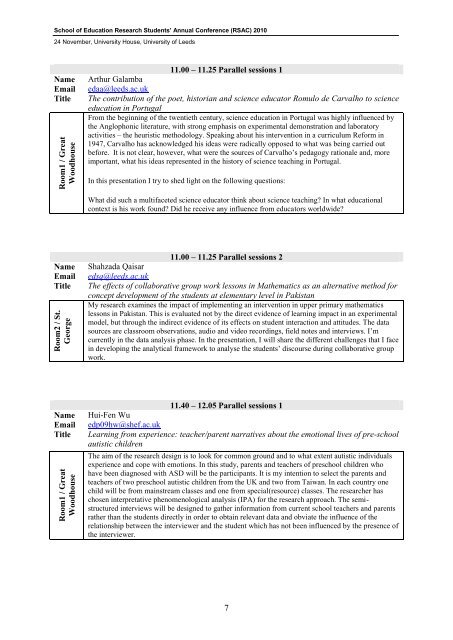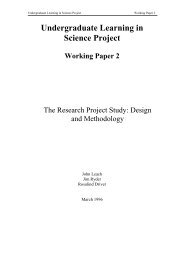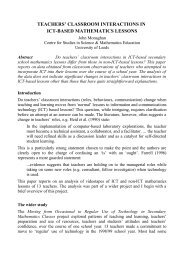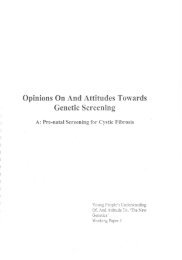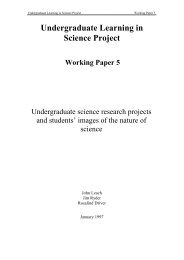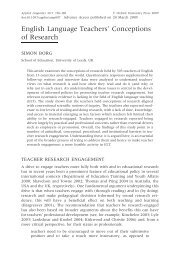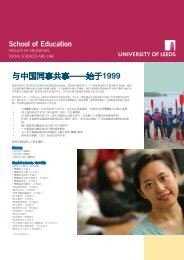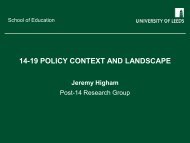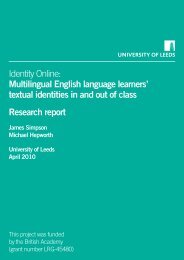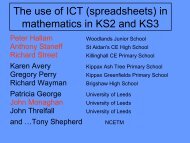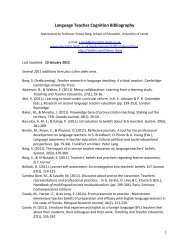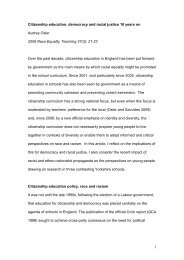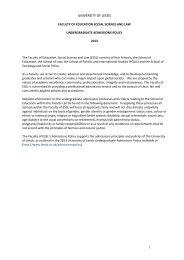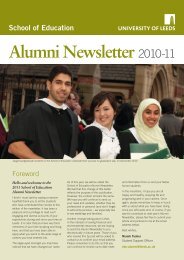Research Students' Annual Conference (RSAC) 2010 - School of ...
Research Students' Annual Conference (RSAC) 2010 - School of ...
Research Students' Annual Conference (RSAC) 2010 - School of ...
You also want an ePaper? Increase the reach of your titles
YUMPU automatically turns print PDFs into web optimized ePapers that Google loves.
Room1 / Great<br />
Woodhouse<br />
Room2 / St.<br />
George<br />
Room1 / Great<br />
Woodhouse<br />
<strong>School</strong> <strong>of</strong> Education <strong>Research</strong> Students’ <strong>Annual</strong> <strong>Conference</strong> (<strong>RSAC</strong>) <strong>2010</strong><br />
24 November, University House, University <strong>of</strong> Leeds<br />
Name<br />
Email<br />
Title<br />
11.00 – 11.25 Parallel sessions 1<br />
Arthur Galamba<br />
edaa@leeds.ac.uk<br />
The contribution <strong>of</strong> the poet, historian and science educator Romulo de Carvalho to science<br />
education in Portugal<br />
From the beginning <strong>of</strong> the twentieth century, science education in Portugal was highly influenced by<br />
the Anglophonic literature, with strong emphasis on experimental demonstration and laboratory<br />
activities – the heuristic methodology. Speaking about his intervention in a curriculum Reform in<br />
1947, Carvalho has acknowledged his ideas were radically opposed to what was being carried out<br />
before. It is not clear, however, what were the sources <strong>of</strong> Carvalho‘s pedagogy rationale and, more<br />
important, what his ideas represented in the history <strong>of</strong> science teaching in Portugal.<br />
In this presentation I try to shed light on the following questions:<br />
What did such a multifaceted science educator think about science teaching? In what educational<br />
context is his work found? Did he receive any influence from educators worldwide?<br />
Name<br />
Email<br />
Title<br />
11.00 – 11.25 Parallel sessions 2<br />
Shahzada Qaisar<br />
edsq@leeds.ac.uk<br />
The effects <strong>of</strong> collaborative group work lessons in Mathematics as an alternative method for<br />
concept development <strong>of</strong> the students at elementary level in Pakistan<br />
My research examines the impact <strong>of</strong> implementing an intervention in upper primary mathematics<br />
lessons in Pakistan. This is evaluated not by the direct evidence <strong>of</strong> learning impact in an experimental<br />
model, but through the indirect evidence <strong>of</strong> its effects on student interaction and attitudes. The data<br />
sources are classroom observations, audio and video recordings, field notes and interviews. I‘m<br />
currently in the data analysis phase. In the presentation, I will share the different challenges that I face<br />
in developing the analytical framework to analyse the students‘ discourse during collaborative group<br />
work.<br />
Name<br />
Email<br />
Title<br />
11.40 – 12.05 Parallel sessions 1<br />
Hui-Fen Wu<br />
edp09hw@shef.ac.uk<br />
Learning from experience: teacher/parent narratives about the emotional lives <strong>of</strong> pre-school<br />
autistic children<br />
The aim <strong>of</strong> the research design is to look for common ground and to what extent autistic individuals<br />
experience and cope with emotions. In this study, parents and teachers <strong>of</strong> preschool children who<br />
have been diagnosed with ASD will be the participants. It is my intention to select the parents and<br />
teachers <strong>of</strong> two preschool autistic children from the UK and two from Taiwan. In each country one<br />
child will be from mainstream classes and one from special(resource) classes. The researcher has<br />
chosen interpretative phenomenological analysis (IPA) for the research approach. The semistructured<br />
interviews will be designed to gather information from current school teachers and parents<br />
rather than the students directly in order to obtain relevant data and obviate the influence <strong>of</strong> the<br />
relationship between the interviewer and the student which has not been influenced by the presence <strong>of</strong><br />
the interviewer.<br />
7


